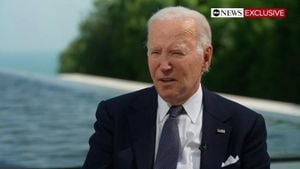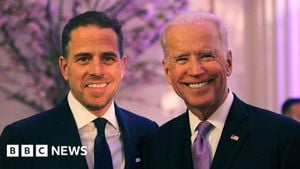Walmart has recently made headlines for its decision to retract its diversity, equity, and inclusion (DEI) initiatives, shifting gears from its earlier commitments following significant pressure from conservative factions. This surprising turn of events reflects the increasingly complex dynamics within major corporations as they navigate public sentiment and political pressures.
Back in June 2020, during the global unrest sparked by the murder of George Floyd, Walmart's CEO Doug McMillon had made bold statements promising to tackle systemic racism. He highlighted the historical failures of the United States' societal structures and committed to creating opportunities for marginalized communities. His passion led to the establishment of the Center for Racial Equity with plans to donate $100 million over five years. It was, by all accounts, Walmart’s attempt to position itself as a leader willing to address injustice.
Fast forward to late 2024, and Walmart's atmosphere has drastically shifted. Recent announcements revealed the company would be significantly scaling back its DEI efforts. Some of the notable changes include halting the sharing of data with the Human Rights Campaign, which monitors corporate LGBTQ+ policies. The company also plans to restrict the sale of LGBTQ+-themed merchandise—specifically items aimed at children—and will cease using the terms "DEI" and "Latinx" altogether. Perhaps most tellingly, Walmart will not renew its agreement with the Center for Racial Equity, marking what seems to be a full retreat from its DEI commitments.
This retreat wasn't made without considerable backdrop—a growing movement among conservative activists opposing DEI programs. One such influencer, Robby Starbuck, has openly claimed victory over these changes, insisting he played a key role by engaging directly with Walmart's executives. His communications pointed to the potential backlash Walmart could face from consumers as midterm elections influenced corporate policies.
Helping to navigate this complicated terrain is no easy feat. Many companies, including Walmart, are now weighing the potential controversy of DEI programs against their bottom lines. David Glasgow, who directs the Meltzer Center for Diversity, Inclusion and Belonging, observed, "I anticipated we might see something like this, but it’s certainly been a ferocious pushback.” This reflects widespread apprehension among corporations as to how to balance social responsibility with adherence to the preferences of their customer base.
Some experts warn this about-face may have unintended consequences for workforce stability and recruitment. Frank Dobbin, who teaches at Harvard University, pointed out the consequences might manifest as difficulties for Walmart to not only attract but also to retain POC employees moving forward. After all, reverting back from DEI efforts sends the message to these individuals—that their identities or needs won't be prioritized within the corporate culture.
Adia Harvey Wingfield, another sociologist and DEI expert, expanded upon this concern. She asserted, "Pulling back from diversity policies reinforces the message they don’t belong." This highlights how corporate policies can significantly influence employee morale and retention, particularly among marginalized groups.
Resistance from conservative circles toward DEI has been rising, especially following the Supreme Court's recent decisions affecting race-based affirmative action. Many corporations now face the looming threat of litigation if they maintain policies perceived to prefer certain demographic groups, contributing to the complex decision-making environment businesses are finding themselves within.
For those working within companies still committed to diversity, the prospect of backlash looms large. Walmart’s pullback from its once-strong DEI commitments sends ripples throughout the industry, prompting discussions about the future of similar policies. Just as one of the world's largest employers adjusts its stance, other companies find themselves evaluating their own paths, wondering whether their commitments can withstand external pressures.
It's important to reflect on who stands to benefit from these corporate decisions, as well. Robby Starbuck has boldly declared himself and other anti-DEI activists as major influences on Walmart's latest policies. He cites the recent elections and voters’ expressed rejection of 'wokeness' as pivotal to this corporate shift. His campaign against so-called ‘woke’ policies is vengeance-driven, reflecting broader sentiments within certain segments of the population.
Starbuck's campaign strategy has taken aim at corporations viewed as stretching their social objectives too far. Companies like Tractor Supply have felt similar pressures and now, with Walmart, the question arises—will more household names follow suit? The variability of responses reflects the tumultuous ground on which these corporate identities stand.
The reality of the situation lies present, as companies like Walmart must decide strategically how they position themselves among consumers spanning both sides of the political spectrum. Many businesses still engage actively within their communities and attempt to ascertain what their customers want—from both perspectives. Moving forward, what will Walmart's brand image look like post-DEI? Will it lose the loyalty of customers who valued their earlier commitments, or will this realignment attract new conservative consumers?
And as the situation evolves, the impact will not only be felt on the corporate level. Civil society continues to watch closely, assessing what working and shopping at these major retailers will signify to both employees and customers alike.



